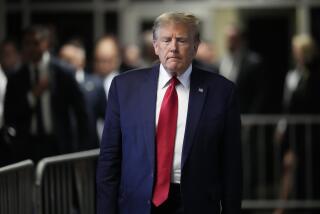Insider Defendants Say U.S. Is Stalling Due to Weak Case
- Share via
NEW YORK — Lawyers for three Wall Street executives accused of insider trading charged Monday that an attempt by federal prosecutors to drop the indictment is an improper tactic designed to win the government time to improve a weak case.
The lawyers asked a federal judge to order that a trial based on the indictment begin as scheduled May 26.
Alternatively, the defense lawyers asked U.S. District Judge Louis L. Stanton to dismiss the indictment now or at a later time “with prejudice,” meaning that the government would be prevented from reindicting the traders on the same evidence used in the existing indictment.
The defense also charged that the government has consistently prejudiced the defendants by claiming to have evidence of their participation in an ever-broader illegal trading conspiracy--at one point announcing in court that the existing indictment represents “the tip of the iceberg.”
Prosecutors declined to comment Monday on the defense assertions. The government is to file an answer with Stanton today, and he is expected to rule on the dismissal motion late today.
Hanging in the balance is the government’s case against Robert M. Freeman, the head arbitrage trader at the investment firm of Goldman, Sachs; Richard B. Wigton, a top trader at Kidder, Peabody, another major investment firm, and Timothy L. Tabor, a former trader at Kidder.
The case is considered crucial to U.S. Atty. Rudolph W. Giuliani’s investigation of trading practices on Wall Street, in part because the three are the only defendants so far to insist on a trial of the charges against them rather than pleading guilty. In court papers filed Monday, the defense lawyers added to what is known about the most controversial aspect of the case: the arrests of the defendants Feb. 11 and 12, well before the government had any documentary evidence on which to base an indictment.
According to an affidavit by Andrew L. Lawler, Tabor’s attorney, Tabor was arrested at home late on the afternoon of Feb. 11 so prosecutors could pressure him, on pain of being jailed overnight, to cooperate with their investigation of Wall Street trading abuses.
The prosecutors, Lawler said, told Lawler and Tabor that the case against Tabor was strong and that he would not be arraigned that night because no magistrate was available--but that he would be freed for the night if he agreed to “secretly record . . . telephone conversations which he was to initiate” with other Wall Street executives.”
Tabor refused, “with the result that he was incarcerated overnight,” Lawler contends.
The three defendants were charged with insider trading on the basis of information given to the government by Martin A. Siegel, a former Kidder investment banker who had been implicated in an insider trading ring by former stock speculator Ivan F. Boesky. The three have denied the charge.
While plea-bargaining with prosecutors, Siegel testified that he and Freeman swapped confidential information about corporate mergers being handled by each other’s firm and that Wigton and Tabor knowingly traded securities on Siegel’s illegal tips.
Siegel later pleaded guilty to a felony charge of having illegally traded stock in Continental Group after having received an illicit tip from Freeman of a pending takeover offer for the company--but Freeman himself has not been charged in connection with the same deal.
Siegel’s lawyer, Jed D. Rakoff, responding to defense assertions that Siegel may have supplied the government with “shoddy” information, said Monday: “I don’t think anyone could sell a bill of goods to Rudy Giuliani. When the time comes, my client’s testimony will speak for itself.”
More to Read
Inside the business of entertainment
The Wide Shot brings you news, analysis and insights on everything from streaming wars to production — and what it all means for the future.
You may occasionally receive promotional content from the Los Angeles Times.









